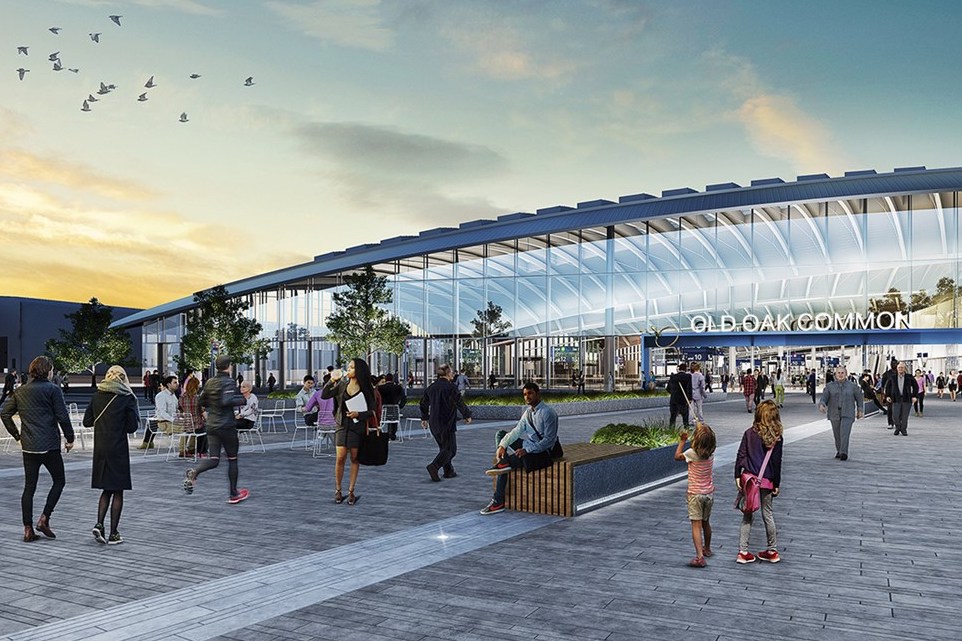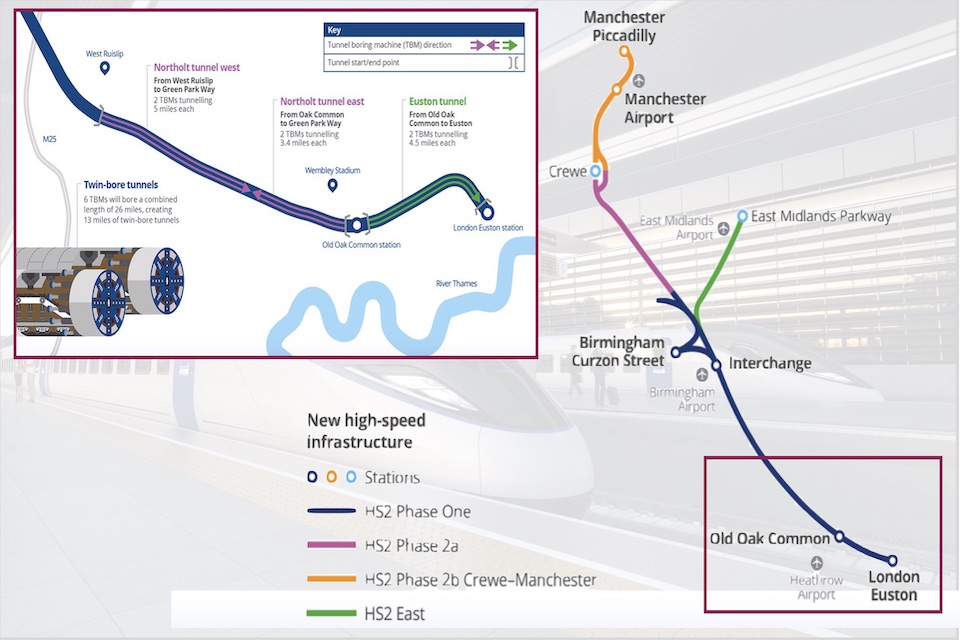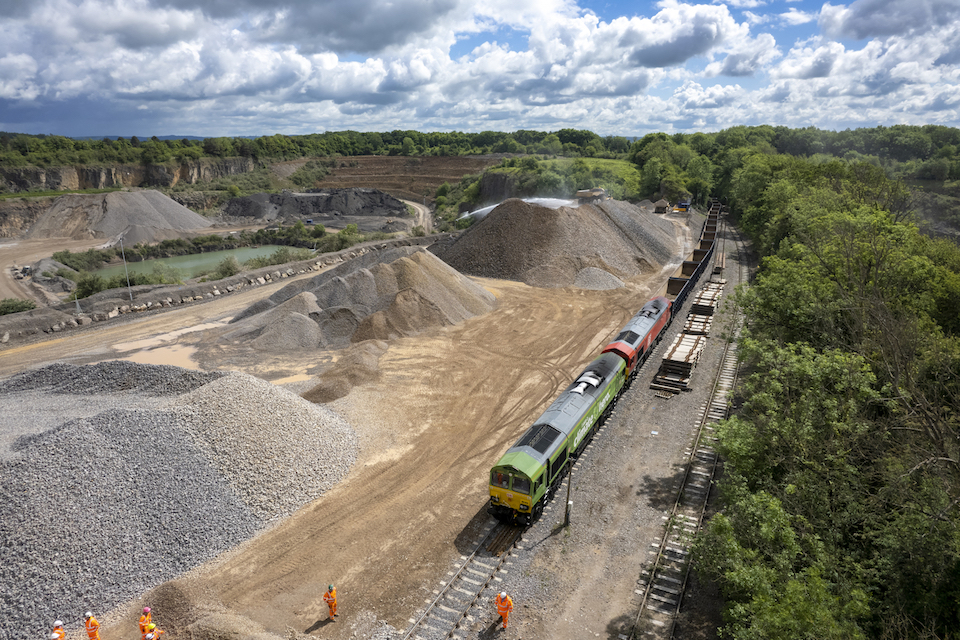Rail freight dismay at HS2 construction delay

Page after page has been submitted in a flurry of fury over the UK government decision to further delay the HS2 high speed rail project. Construction had already been extended, with elements of the project cancelled or postponed indefinitely. Now the core London – Birmingham section is to be delayed by a further two years. The government in London is calling this a move to “rephase construction”. Commitments have been given for the extensions beyond the core section, but these have already been met with scepticism.
Rail freight operators, the supply chain, the construction industry, and business at large have all commented adversely on the announcement from transport secretary Mark Harper that HS2 is to be delayed in completion. Originally, HS2 trains were expected to be running in 2026 between London Euston and Birmingham Curzon Street. That had already slipped to 2029, with the London services terminating at Old Oak Common for at least five years. The two additional years of delay will take the eventual running of the first train back to around 2033.
Hugely disappointing news for rail freight
HS2 is not just Europe’s biggest single civil engineering project, it’s becoming a byword for delay and over spend. The budget has already increased by around three times from a figure of 33 billion pounds (around 43 billion euro). Originally promoted as a ‘game-changer’ for journey times around the UK, the section of the high speed network not in immediate jeopardy is the line between London and Birmingham, where journey times are expected to be reduced from just over eighty minutes to just under one hour. With longer routes abandoned, the project has been repurposed as a network-wide capacity enhancement, principally relieving the West Coast Main Line, which is already Europe’s busiest mixed-traffic railway. However, those benefits are disappearing over the horizon, as the government chips away at the project’s scope and delivery dates.

The recent announcement that the central London terminal at Euston would not be ready until at least five years after the opening was a blow to the commercial appeal of the railway. Now, the revelation that trains will not run in this decade has put the brakes on the expected capacity enhancements too. That, says Maggie Simpson of the Rail Freight Group, is also hugely disappointing news for rail freight. With the added delay and uncertainty over the extensions to Crewe and Manchester (so-called Phases 2a and 2b) there is no perceived benefit for rail freight capacity, adds the director general of the RFG. “The West Coast Main Line is the most important route for rail freight in the country and we need capacity to deliver growth. The delay to phases 2a and 2b will seriously impact on the available capacity, particularly if new HS2 trains are now forced onto the existing tracks.”
Minister invents “rephased construction”
Putting a brave face on the matter, the government’s transport secretary Mark Harper put the blame on everyone and anyone, as long as they didn’t carry a government staff card. “Since agreeing this programme, we have seen headwinds from inflation, triggered by the impact of Putin’s illegal war in Ukraine, as well as supply chain disruption as the global economy recovers from the effects of COVID-19”, he said to parliament. “We will ‘rephase’ construction by two years. The government is prioritising HS2’s initial services between Old Oak Common in London and Birmingham Curzon Street”, he added. Harper also gave untimed assurances and commitments to the Crewe and Manchester sections, and a mention of what he called “HS2 East” (presumably the proposed route for HS2 services between the West and East Midlands), and to consider the most effective way to take HS2 trains to Leeds. On the latter point, most industry observers have already identified the most effective way to achieve that: build the cancelled high speed line to Leeds.

“Rail freight businesses are also working support the construction of HS2, with materials supply and engineering services”, added Maggie Simpson. “The delay in the later phases will now undermine this, risking jobs and investment. Government must seriously reconsider this decision and find a way forward which supports the rail freight sector.”
Half-baked effort is a disappointment
Britain’s rail freight operators may be at the sharp end of disappointment. Major capacity enhancement on the national network is needed if rail freight is to answer the demands for modal shift and radically increase traffic. In a widely reported broadcast interview, John Smith, the chief executive of GB Railfreight, called the delayed and curtailed project a “half-baked” effort. “HS2 [is] critical in terms of freeing up capacity on the network”, he told the BBC. “Doing it half-baked like this creates a number of problems, not least that the traffic on it that heads to Liverpool, Manchester and further north to Scotland will now spit itself out onto the old infrastructure at places like Crewe.”
John Smith is among those who are sceptical that the HS2 project will ever find its way north of Birmingham. “I understand the delays, and money doesn’t grow on trees, but there should be a complete project”, he told the national radio audience. “I think whilst it might save in the short term, I’m fairly convinced it will cost more.” His scepticism may be well-founded. In an act of political spin, the official announcement from the Department for Transport is headlined “Record investment plans for transport network”. As with delivery dates, the rephrasing in that “rephasing” demands close examination.






Picture of the “virtual quarry” above: surely what’s meant is Westminster has “invented” the contraction element of HS2″?
Re the picture of the “virtual quarry” above, surely the caption should read “Westminster has invented the “contraction” element of HS2″?
I sit all day watching the Crewe – Manchester line at the end of my garden. Most container freight trains are less than half full. Difficult to see the urgent need for more capacity. Same goes for the passenger trains too tbh.